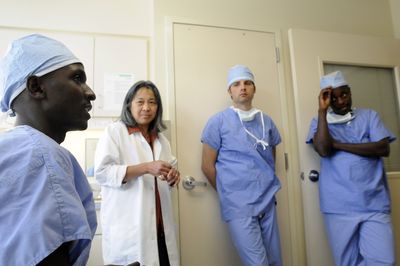Rwandan doctors seek new ideas
Physicians visit Spokane through Deaconess program

Rwandans can now count Spokane doctors and health care workers among their extended family.
Teams of surgeons, nurses and other medical professionals have traveled to the central African country during the past year to treat patients and train people as part of a goodwill initiative to improve care.
Now two Rwandan doctors have traveled to Spokane courtesy of Deaconess Medical Center to learn firsthand how hospitals are operated – from the moment a patient arrives in the emergency room to how every department works to ensure proper care is delivered.
“We want to try to set up a model system based on how things are done here,” said Dr. Aflodis Kagaba, who said he was impressed with the speed at which patients were admitted and treated. He and fellow Rwandan Dr. Dan Rudasingwa worked with Spokane cancer surgeon Dr. Ryan Holbrook to remove a melanoma from a patient’s face and then performed a lymph node biopsy to ensure the cancer hadn’t spread.
“It’s important for us to understand process,” said Rudasingwa, “to see how care can be well-organized, from administration to lab work.”
It’s all part of the Ujamaa program. Ujamaa is Swahili for “extended family.”
“We just thought it was very appropriate because we wanted to establish a partnership with local people,” said Dr. Pam Silverstein, a Spokane obstetrician and gynecologist.
By many accounts the effort is working.
The Spokane physicians worked in rural health clinics in the poorest areas of Rwanda. Silverstein worked with nurses who deliver the vast majority of the nation’s babies.
She taught them about complicated vaginal deliveries, such as breeched births, that can endanger the lives of mothers and newborns.
Eighty percent of Rwandan births are home deliveries, and the nation has a poor safety net in case something goes wrong. The nearest emergency rooms can be hours away from a woman’s home, which leads to heartbreaking statistics: 86 babies out of every 1,000 born die within the first year of life. About 20 percent die before age 5.
Yet Rwanda has come a long way in the 15 years since civil war and unrest erupted into genocide. The killings of 800,000 people in about three months shocked the world and underscored a general apathy toward Africa.
Today the country is making great strides, said Rudasingwa. The country is home to 10 million people with a total of about 280 doctors. That’s about one doctor for every 36,000 people.
If such a ratio were applied to Spokane County, there would be 11 doctors here rather than the more than 1,000 who are practicing now.
Seeing such a system at work imparted lessons for the Spokane doctors, too. “This is a country where the people are so eager to move forward,” Silverstein said. “That willingness to learn and try new ideas is so important. I won’t forget it.”
Kagaba and Rudasingwa arrived in Spokane April 20 and will return to Rwanda May 8.
Besides visiting Deaconess, they will visit the Inland Northwest Blood Center, the Spokane Regional Health District, several outlying clinics, the Ronald McDonald House and the Spokane AIDS Network.